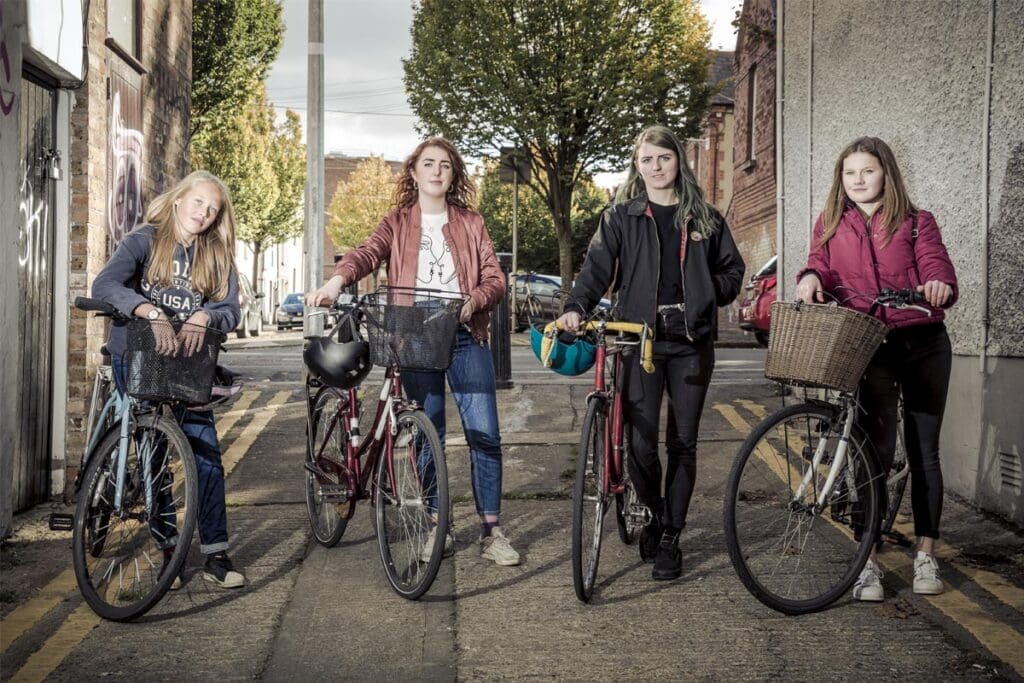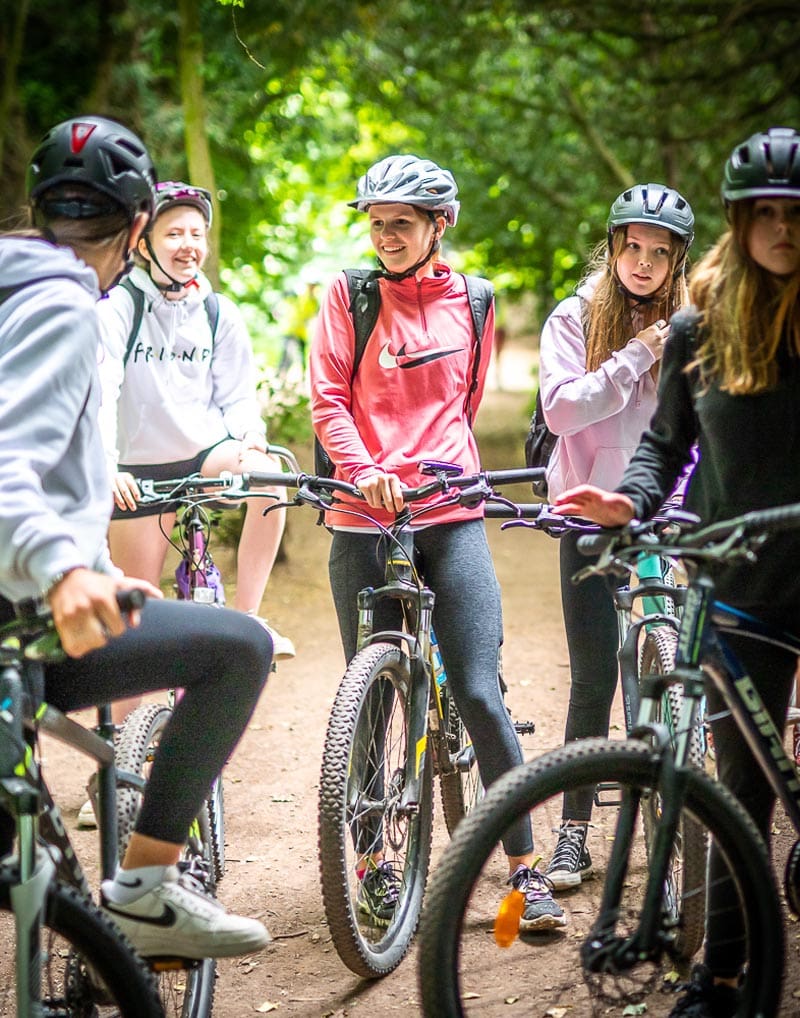Curious Approach Putting the Power in Girls’ Hands

Perth, WA
When was the last time you saw a group of girls cycling together?
That’s the key message being employed by a new WA pilot program aiming to increase cycling participation rates among girls and women aged 15 to 20.
“That seems to cut through and really focus people’s attention. They pause and realise they can’t remember,” according to Karen Lee, the founder of the Bike Curious program.
“The world is particularly uninformed about what girls are experiencing.”
“That question seems to be a shortcut to people understanding what we’re trying to tackle.”
Faced with particularly low cycling rates among this demographic, Bike Curious is aiming to break from convention and fully empower its target audience to take control of the cycling promotion to girls and young women.
“While we know stuff about barriers, gender barriers, there’s a lot we don’t know. Our premise is not to make assumptions about what’s stopping them and not to guess, but to ask,” Karen explained.
“The world is particularly uninformed about what girls are experiencing, so when you look at behavioural change programs aimed at increasing cycling rates in Australian and NZ, they aren’t incorporating lived experience of girls in this age group.
“There’s very little research into how they feel and what needs to change so they can ride as much as boys do,” she added.
“It does correlate with the lack of women’s voices in transport planning more broadly. There’s a number of factors contributing to that.
“We’re not coming at it from a sport angle and not talking about what they should be doing: like you should be riding because it’s good for the environment or it’s good for your body.”
Workshop Format
Karen’s creative urbanism practice, Solidaria, in collaboration with WA cycle advocacy group West Cycle, is preparing to launch the Bike Curious program as a series of four workshops.
“Instead of making participants jump on bikes or telling them what they should do, the workshops will create spaces to hear from them, in their own words, what their experiences have been and what they think might need to change and then empowered them lead some of that change,” she said.
“The workshop program steps through their experiences and barriers to lead them to the creation of actions.
“We’ve also focused heavily on creating options within those space. In any given workshop, you don’t have to sit in a circle and say stuff out loud if you don’t want to. There’s a real mixture of activities so there’s no pressure to be a particular kind of communicator.
“There’s always a solo activities people can go off and do it they want. Then there’s a mixture of small group, whole group, verbal, non-verbal, written, drawing, to create comfortable spaces for everyone to express themselves.”
She said this approach, going right back to identifying why girls do or don’t ride and enabling them to take the lead, was possible because of the program funding provided by WA Government health promotion agency Healthway.
“It has an innovation fund designed to address people aged 15 to 20 who are not members of sporting clubs and are not particularly active, which is why that’s our age parameter,” she said.
“They will fund experiments that aren’t about playing sport right now. So rather than saying to girls, ‘get on your bikes now’, it gives us an opportunity to have more of a conversation and do the step beforehand to ask what’s stopping them.
“We’ve quarantined some of that funding so they can immediately take the actions they identify and put them into the world.”

UK Role Models
Early last year, Karen started researching how she might approach the program.
“I looked around for something addressing cycling rates and the barriers for this age group and I couldn’t find everything in Australia. I looked further afield and found the program #andshecycles run by Green Schools Ireland and Sustrans Scotland,” she said.
“It’s the idea their voices and platforms are most likely to speak to their peers.”
“Looking at that program and its successes, and looking at how it might convert to an Australian context, was the basis of our application for funding.
“While #andshecycles was more of a campaign program, we’re saying participants can design campaigns to influence their peers, or they can do other things. We’re using creative activities to get them to devise artifacts that can be posted online or generally influence people like them.
“It’s the idea their voices and platforms are most likely to speak to their peers.”
Since then, the Bike Curious team has been adapting the #andshecycles approach, and has its website and social media materials in place.
It has also recruited a team of workshop facilitators who have experience working with women and girls in this age group and are skilled in getting them to talk, by creating fun and safe spaces where they want to participate.
The pilot workshops will be conducted with captive audiences.
“We have some secured host sites and have some still in negotiation,” she added.
“The challenge is getting someone to actively participate in a discussion about something they might not care about or not know they’re excluded from. Trips not taken are difficult to interrogate and gather data on and that’s kind of what we’re asking – so at this stage, were going out to audiences such as school groups.
“Across those four sites, we’ll have about 100 participants, so it’s quite a small pilot but large enough to get sufficient data to start to see patterns, to maybe alter the program to make it more impactful.
“We know some of what that might lead to, based on the program in Scotland and Ireland, but we’re leaving it super open so it can be completely controlled by the participants, then we facilitate the actions to the extent they need support.
“At that stage, we can also start to make arguments about continuing it elsewhere or testing it further. We’ll have more intelligence about what parts of the conversation connect with them and their experiences.
“We’ve taken an intensive approach to evaluation. We’ve got a lot of touchpoints for evaluation without overwhelming the participants.
“The sites will all be delivered in the next couple of months and we should see results of the evaluation by September.
“We can use that to consider whether we can hold it as a public audience or whether captive audiences continue to be the model.”
Karen said program’s evolution includes building the community and the conversation on social media.
“That’s what’s happened with #andshecycles. It becomes quite advanced as girls start to use the hashtag and contribute to an online community,” she continued.
“We’ll then be in a better position to trigger interest. When we have more Australian girls speaking about their experiences, or we at least have materials with them talking about their experiences, then that brings out more people who want to be part of that conversation.”
Karen has already received expressions of interest from groups keen to take Bike Curious beyond the pilot.
“We’ve been contacted by a few local governments who have said they’d like to take this program to their area,” she said.
“We’re looking at what the delivery model and the funding model might be, certainly scaling it in WA and perhaps sharing it nationally.
“There really is widespread interest, including State Government in Queensland.
“I think the approach could be similar in different parts of Austalia but that’s something we have to think about and, in every context, you need to ask the girls.
“I’d like us come out with an adaptable model because I think the idea you can do the same thing everywhere and it will work is probably not realistic for all communities.
.
“But because it puts the girls’ experience at the centre, with flexibility and various options for participation so different types of people can engage, it can probably can be delivered somewhat similarly.”
“Our call to action at the moment is just for people join the mailing list and please be part of our community. We’re just encouraging people to talk about it and asking girls close to them about what is missing for them.”
Welcome Partnership for WestCycle
WestCycle’s active transport manager, Dr Georgia Scott, said Karen approached the advocacy group in early 2022 to propose the collaboration and her organisation jumped at the opportunity.
“It’s partnerships like this we keep looking for, to make advocacy fun and with activities that really engage audiences,” Georgia said.
“Karen has created amazing music festivals over here and is coming into it with an amazing perspective.
“It’s a great partnership for WestCycle as part of our shifting focus from just the activity of riding a bike to really asking the question of what role do bikes play in our lives and what communities do we want to create. How can people riding bikes help create those types of communities?”

Just a gentle reminder Ireland is not in the UK
Good point, thanks Jennifer. I’ve remedied that – otherwise my in-laws might not let me back in the country!
Just a gentle reminder that Ireland is not in the UK. Should read Irish role model. Thanks